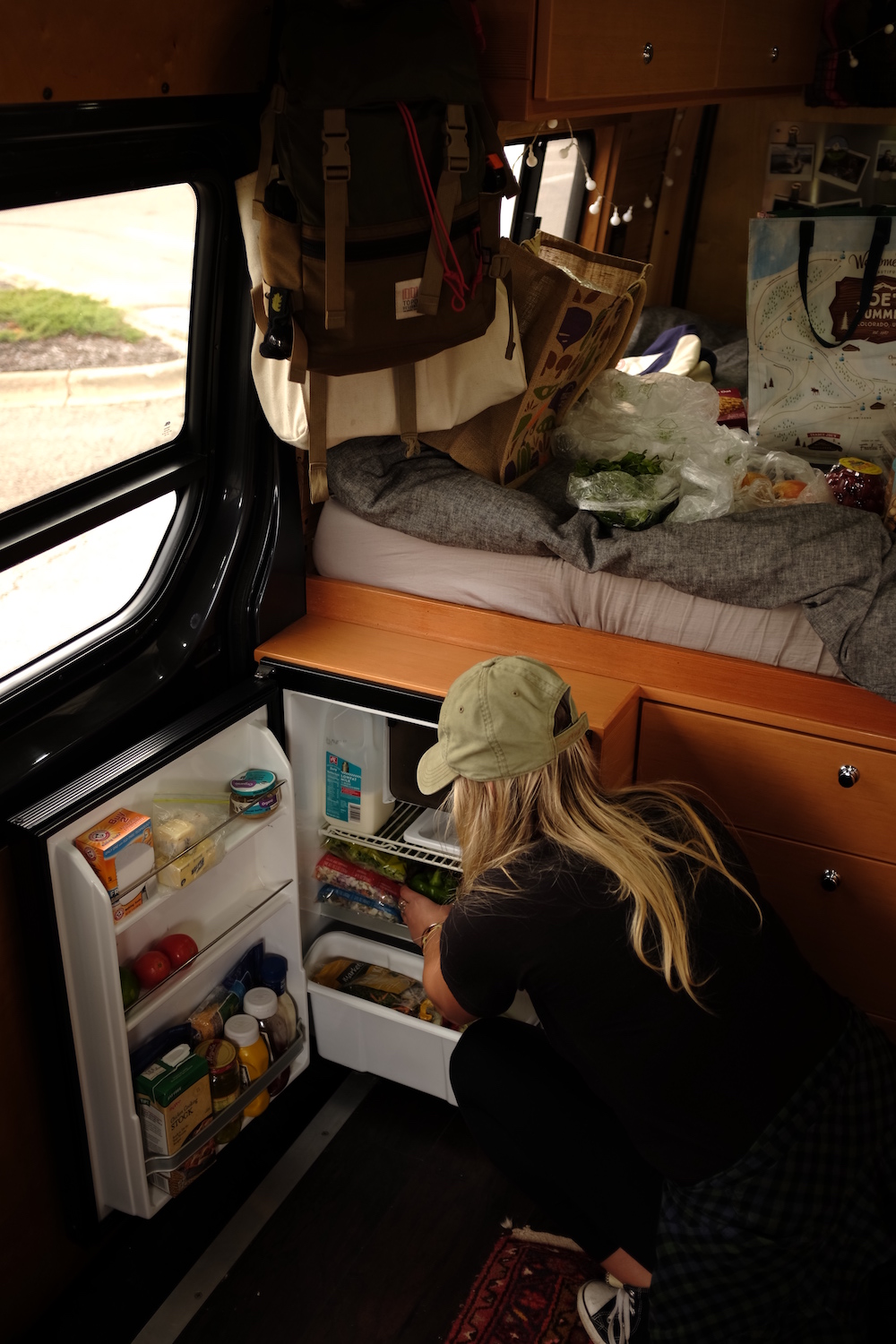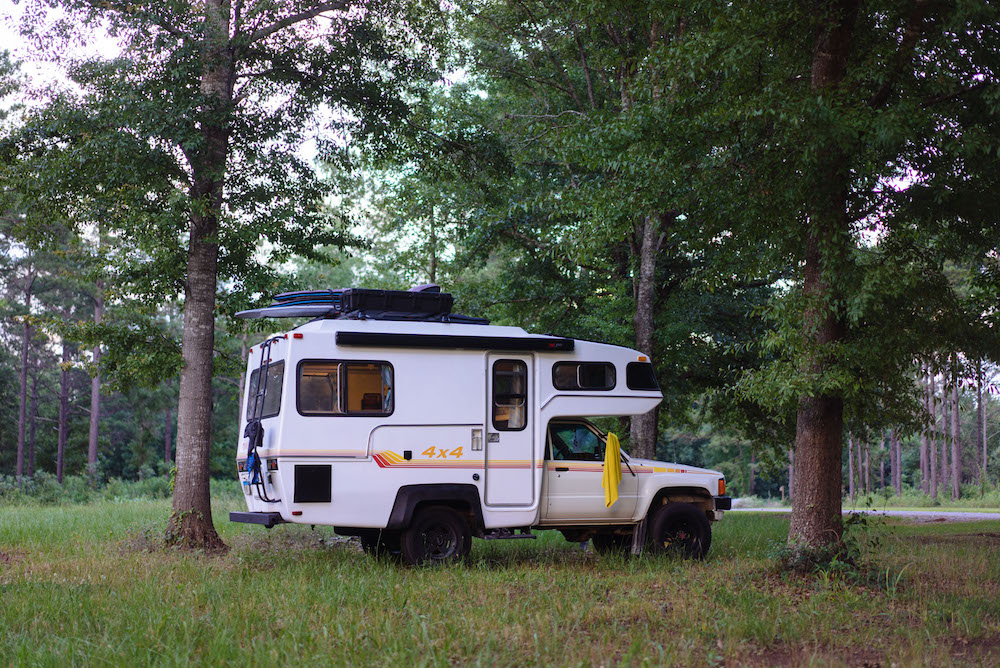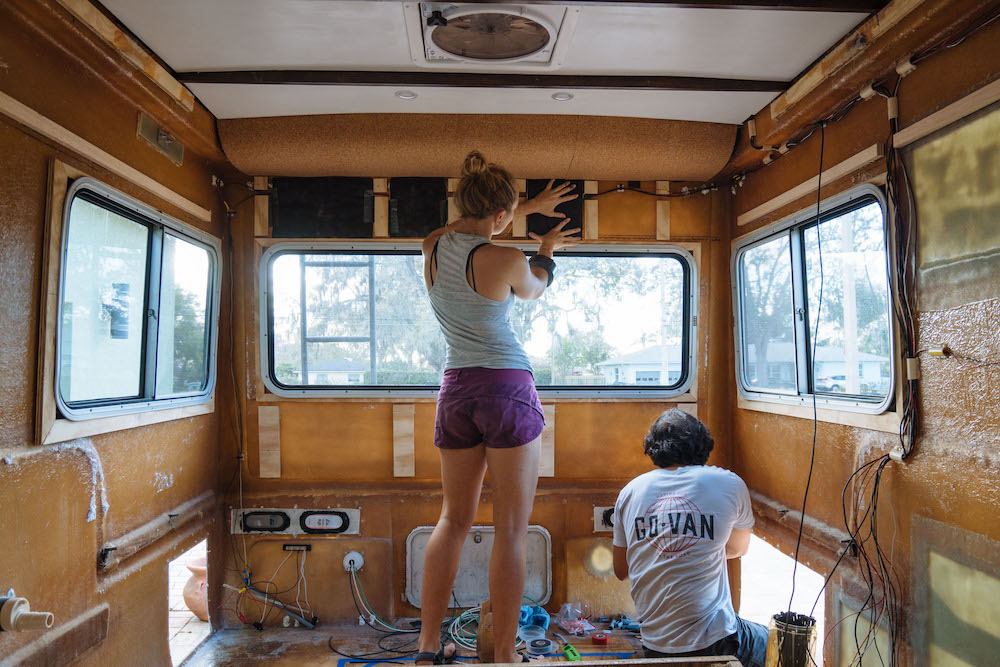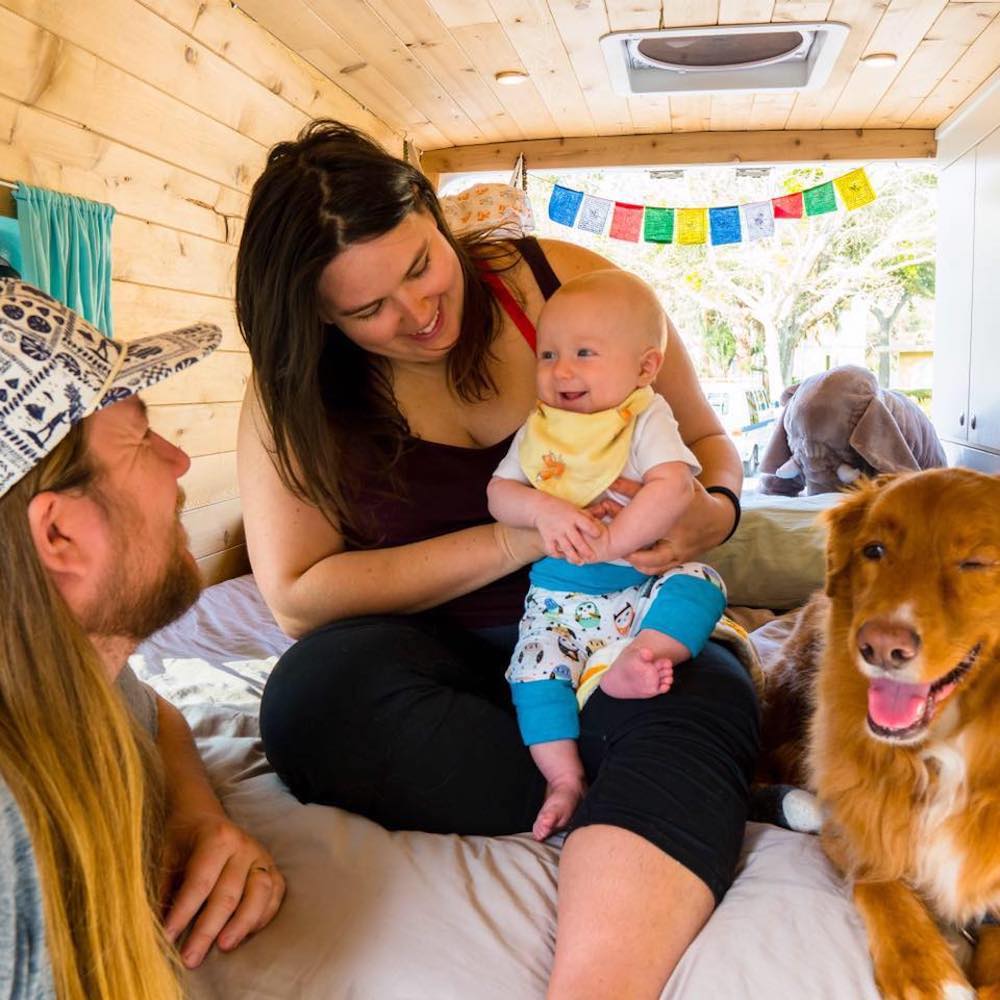Deciding to move into a van is a big decision with many factors to consider.
Like all major decisions, it is best to do research before diving into a large decision, especially when it means changing around  your life. One of the best ways to do research is by talking with others who have experience, which in this case, means vanlifers who are currently living in a van. Our team is filled with individuals who have been on the road for many, many years. Even more so, road travel looks different for all of us, varying from part-time to weekenders to full-time. We’ve pooled together to share our best advice with you, complete with 10 things you need to know before living in a van.
your life. One of the best ways to do research is by talking with others who have experience, which in this case, means vanlifers who are currently living in a van. Our team is filled with individuals who have been on the road for many, many years. Even more so, road travel looks different for all of us, varying from part-time to weekenders to full-time. We’ve pooled together to share our best advice with you, complete with 10 things you need to know before living in a van.
Sponsored by 76®. Don’t forget to check out their First 30 Day series, all about diving into vanlife and life on the road!
1. Don’t buy a vehicle based on trend – buy a vehicle that will suit your personal needs best.
There are a lot of vehicles that you will see over, and over, and over again. The internet makes this true now more than ever. Between Instagram, Youtube, and Pinterest, it is easy to get caught up in the fads. My best advice: do your best to avoid social media clouding your judgment. The internet is wonderful to get ideas and inspiration but is not a strict rule book for anything. The Chevy Express may be the perfect van for someone while a brand new Sprinter may be the perfect fit for the next someone. It is important to figure out what will suit your needs best.

Vehicle choice will vary on personal preference. Think about your mechanical knowledge or desire to learn more, your budget, speed of travel, how long you plan to travel in this vehicle, etc. All of these things are going to help you figure out which vehicle will best serve your needs. If your goal in buying a van is to learn how to work on it, consider purchasing an older or more vintage-style vehicle. If your goal is to travel far and wide at a fast pace, consider a new, reliable vehicle that will require less up-front work. While your house is still your home and aesthetics should be taken into consideration (you obviously want to like where you live), functionality and being realistic are really the best motivators in this situation. Unsure of where to start? Check out this article about choosing the right van for you.
2. Have a plan in place to figure out overnight parking/sleeping situations.
There is nothing worse than being utterly exhausted and driving around in the dark, trying to find a place to sleep. In those moments, you will question everything and tears will likely be shed. It is important to know that this is normal – it happens to everybody. However, there are things you can do to make this part of vanlife easier. Know which apps to use, ask for recommendations from other van lifers, and do your research. Over time, you may acquire the skills to look at a street or a parking lot and recognize if it is legal to sleep there and if you will or will not get knocked on. Until then, use apps.

We recommend Park 4 Night, iOverlander, Camp and RV AllStays, Campendium, and FreeCampsites.Net. Use these resources to not only find free campsites on public lands, such as National Forest and BLM, but to also decipher which business establishments will allow you to overnight park. Generally, (most) Walmarts, Bass Pro Shops, Cabela’s, and Cracker Barrel locations will allow you to sleep in their lots. Even so, use your apps and online resources to be sure. If you’re smart, you can seriously diminish the likelihood of being woken up in the middle of the night and being asked to move. Plan ahead, be smart and find safe options.
3. You have to find forms of self-care on the road.
Whether you travel alone, with a partner, with an animal, or in any other form, self-care is still extremely important. This will look different for everybody but do not underestimate this. Vanlife is a wonderfully relaxing lifestyle in many ways but it also can be very stressful and takes time to get used to. Put an intentional structure in place to practice self-care on the road, even on the busiest or most stressful days. These are likely the times you will need self-care the most.

This could look like waking up for sunrise, enjoying a cup of coffee or tea, and doing yoga. Other times, it may mean mid-day meditation or a balance of healthy foods and exercise. For others, it means a combination of all of these. Know what works best for you and make it a priority. If you don’t know what works best for you, use this new freedom to explore various options of self-care. You will never regret making time for yourself and your health.
4. Living in a van is still living. There are still chores and daily tasks, maybe even more so than regular stationary life.
My first year on the road full-time, I was living off savings and intentionally unemployed. I was constantly asked, “What do you do with all your new-found free time?” My consistent answer was, “What free time? Living in a van is nearly a full-time job!”. While your chores may take you less time than living in a house, they still exist. Your trash and recycling, toilet, water source, etc. are all smaller and in theory, should take less time to handle. However, they need to be handled more frequently than normal in-house chores because they are smaller.

On top of the normal cooking, cleaning, and maintenance that a home requires, living in a van has additional chores; filling propane, getting gas, acquiring drinking water. Your fridge and storage are smaller so you have to go grocery shopping more frequently and are limited by not having storage for buying bulk. Even more so, you have to figure out where you are going to sleep every night. Planning longer trips requires figuring out directions, routes, and places to stop to site see or explore. While some of this is fun and exciting, chores are still chores. Living in a van takes a lot of energy. You lack stability in the sense of stationary living, which requires constant maintenance and planning. While I whole-heartedly believe that all of this is worth it, it is still something to note before diving head-first into this lifestyle.
5. Don’t just budget for the upfront cost. Remember that there will be maintenance costs throughout the years.
Last year, I made the decision to take over a large loan for my newer, very reliable, memory-filled van that I am quite attached to. I worked hard to make this happen. I’ve taken on extra work, live on an extremely strict budget, and am very intentional with the care of my vehicle. However, when buying this vehicle, it wasn’t just the down payment or the monthly payment of my financial vehicle loan that needed to be taken into consideration. Maintenance is a huge part of owning a vehicle, especially when your vehicle is your home and you are driving it much more frequently than normal.

For example, just last week, I had to have my entire brake system replaced, which cost well over $1,500. This was on top of regularly scheduled maintenance, which cost an additional $1k. While these numbers were not part of my initial or regular budget, they still are necessary for maintaining a healthy and happy van. So remember – when you see a price on a van or adventure vehicle, you also need to take into consideration: gas money, insurance policies, and maintenance costs. Have extra money saved or budget to put extra money away each month to plan ahead for these inevitable bills.
6. Have a plan in place to make money on the road, ensure your lifestyle is sustainable, or, at the very least, have a plan of action to support yourself.
This piece of advice encompasses many factors, options, and pieces. The first is this: just because you’re living in a van, it doesn’t mean that you are constantly moving or working remotely. Plenty of vanlifers hub around certain cities or areas and work part-time or full-time. Many individuals will do whatever they need to do to sustain their lifestyle. Regardless of whether you plan to move around constantly or stay in one place, like any time in our adult-lives, you need to have a plan in place for making money. Whether this means saving up and living off those savings for a set amount of time, working a stationary job, or working remotely, please, please, please have a plan in place.

My best recommendation is to have a set amount of money before diving into the lifestyle that you can live off for a bit while you figure out details, and also to have at least some amount of money to fall back on in case of emergency. From there, know how you will make money, have an end-date in mind, or, if you plan to continue traveling, at least put a plan in place to take steps towards making money.
7. Think realistically about how long you want to do this for.
First and foremost, it is important to make something clear. Once you’re on the road and have a general plan, it is always okay to change your mind and you are, of course, allowed to stop vanlife at any point if it isn’t working for you. With that being said, having a general plan in mind will make a huge difference in preparing to hit the road and start living in a van, and actually making it happen.

Think about if you plan to do this for a summer, a season, a year, multiple years, or more. This will likely affect what kind of vehicle you purchase, how you build it out, what gear you need, etc. Beyond thinking about how long you want to travel via van for, think about if you plan on keeping your van even after you’re done with your travels or if you plan to sell it. Additionally, don’t let the planning and this article itself deter you from actually doing it! You just have to be realistic with how long you want to live this lifestyle. It will affect how much money you need, what kind of build you need, and what kind of vehicle you need.
8. Be flexible. Don’t be too rigid with plans.
Like previously mentioned, you are allowed to change your plans at any time or even stop vanlife completely. This lifestyle isn’t for everybody – stop if you feel the need. Take a break if you burn out. Even the most “experienced vanlifers” take breaks and hiatuses. People bouncing back and forth between part-time, full-time, and weekending is common. Don’t believe us? Listen to this Women on the Road podcast episode detailing why different women changed their adventure plans. Even beyond big changes with plans, don’t be afraid of small changes either. Be flexible and willing to stop for an antique shop or monument that catches your attention. Understand that the weather will change and may affect your plans. Vehicles may fault, accidents can happen, and road construction will definitely slow you down. Planning ahead is great but being adaptable is just as important.

9. You will save money by doing a build yourself but it will require time, patience, and skills.
When deciding to build out your own van or pay for a professional, the biggest factor to consider is the cost of labor. Building something as intricate as a van is not exactly easy. If you’re unwilling or unable to do this yourself due to time or skills, you will pay the price in labor costs. Additionally, some builders are extremely flexible with allowing you to choose your own specific design, including specific types of material during different build phases, and working with your timeline. However, that is not always the case. Doing a build yourself allows you to truly customize your van exactly as you wish, down to the smallest details.

Don’t forget to take the cost of tools into consideration! You will likely need to purchase the necessary tools for all the phases of a build. Be prepared for things to take a little longer than expected, for things to go wrong before they go right, and build up as much patience as possible beforehand. Building a van requires time, patience, and skills, but most vanlifers that went the DIY van build route, myself included, would make this same decision time and time again. If you do decide to dive into a DIY van build, check out our vanlife guide, where we break down all the different phases of building your own van!
10. Give yourself room to grow into your van.
A common story is one of an individual that planned for living in a van for six months or a year. Before they know it, they’ve fallen in love with the lifestyle and decide to continue beyond their original timeline. For this reason, I recommend giving yourself room to grow in your van. This can mean making room for a partner, animal, kids, souvenirs, or anything else. Minimize your belongings more than you think so you have the freedom to invite memorabilia from your travels into your van. If you are a solo traveler, consider the fact that you may not be single forever. If you plan on having children in the near future, think about where that extra seat could go. You may just fall in love with this lifestyle and decide to pursue it for longer than you originally thought. You never know what can happen!




